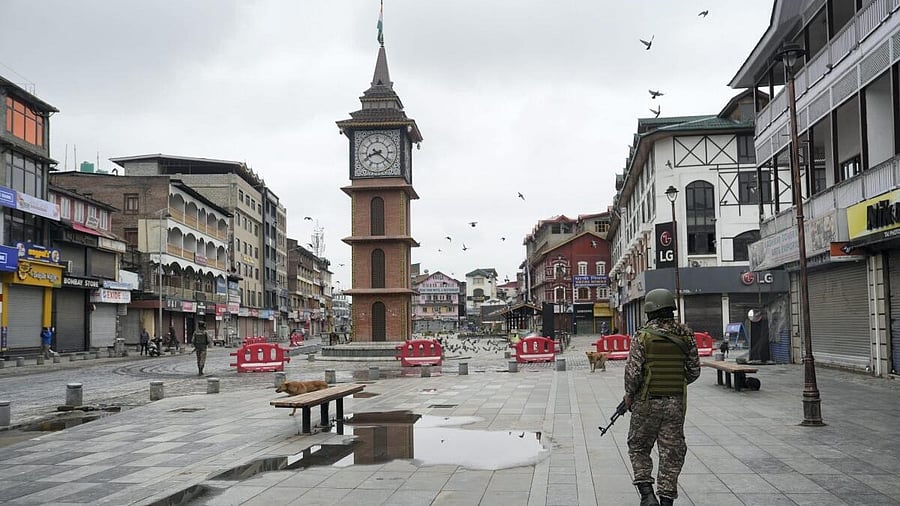
Security personnel keep vigil amid prevailing India-Pak tensions, in Srinagar, Saturday, May 10, 2025. Multiple blasts were heard in Srinagar city early Saturday morning, hours after the Indian military thwarted drone attacks by Pakistan at several places here late last night.
Credit: PTI Photo
Srinagar: As hostilities between India and Pakistan armies escalate following a spate of drone and munitions attacks on military installations and civilian areas along the western border, panic has begun to grip everyday life in Jammu and Kashmir.
In recent days, residents across both Kashmir and the Jammu region have resorted to panic-buying of food, fuel, and other essential supplies, fearing further military escalation or a possible lockdown. Early market closures, evening blackouts, and long queues outside grocery and medical stores have become a common sight.
This pattern of stockpiling is not unfamiliar in the Kashmir Valley, which has lived through decades of unrest, curfews, communication shutdowns, and highway closures. But what’s different this time is the anxiety now spreading deeply into the Jammu region — traditionally seen as more insulated from direct conflict.
“We have seen curfews and shutdowns before, but this feels different. People are scared. There are too many rumours,” said Wahid Rather, a shopkeeper in Ganderbal town of central Kashmir. “By afternoon, shelves are empty — rice, pulses, oil, and even candles and batteries.”
In Jammu too, the mood is tense. “I never thought we would face something like this here,” said Rakesh Sharma, a resident of the border Samba district. “We’ve stocked the dry ration to last one month. My children refuse to sleep unless the lights are off — they think drones will target us if they see lights.”
Markets across the Union Territory are now shutting down as early as 5 pm or 5:30 pm amid widespread fear of night-time drone or missile strikes. Several towns have also enforced unofficial blackouts, with lights turned off in public and residential areas after dusk to avoid detection from aerial threats.
The Central government, sensing the growing public anxiety, has issued appeals urging both shopkeepers and the general public not to panic or hoard. Officials have assured that there is no shortage of food, fuel, or other essentials, and that robust supply chains remain in place to handle any emergency.
However, these reassurances have done little to calm nerves, especially in border districts where shelling has intensified.
The current tension follows the April 22 terror attack in Pahalgam, where 25 tourists and a local guide were killed — one of the deadliest civilian massacres in Kashmir in recent years. Since then, several drone and missile attacks —originating from across the border — have been reported in Srinagar, Baramulla, Jammu, Udhampur, and Samba, forcing Indian forces into a heightened state of alert.
With memories of past lockdowns and conflict fresh in the minds of residents, many say they prefer to be over-prepared than caught off guard. “It’s not just about food — it’s about safety, about survival,” said Mohammad Yasin, a father of four from Anantnag. “We don’t know what tomorrow brings.”